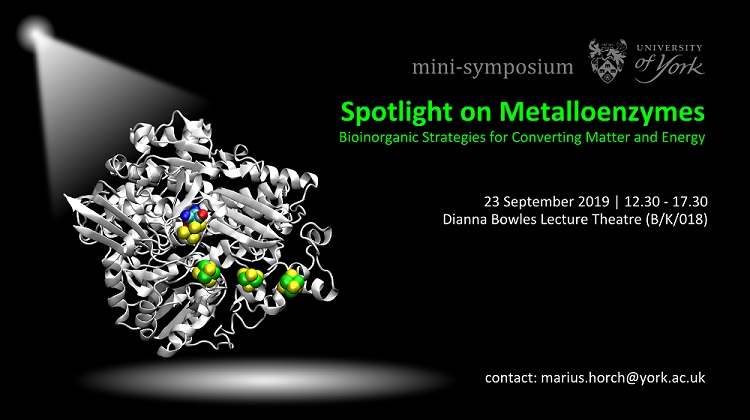Spotlight on metalloenzymes symposium
Monday 23 September 2019, 12.30PM

Registration via Eventbrite is possible until 16 September:
Cellular metabolism builds on a plethora of highly orchestrated biochemical reactions that convert matter and energy. Many of these reactions are catalysed by complex metalloenzymes, some of which can be traced back to the earliest known organisms and the emergence of life on earth. Besides a fundamental interest in their biological function and impact, metalloenzymes also represent valuable targets for sustainable approaches in industrial synthesis and energy supply. Exhibiting unrivalled efficiency and selectivity, they can be utilized in biotechnology and bio-inspired catalyst design if their structure, function, and dynamics are understood on a fundamental level. This multidisciplinary symposium thus aims to bring together scientists from York and abroad to discuss recent progress and challenges in metalloenzyme research from a molecular, cellular, and application perspective. Since most processes catalysed by metalloenzymes are thermal reactions, a key objective of this meeting is to explore future avenues for using light as an additional reactant in order to provide new strategies for experimental control and sustainable reaction cascades.
Session 1 | Chair: Neil Hunt
12.30 Introduction
12.40 Amanda Jarvis (University of Edinburgh)
Session 2 | Chair: Robin Perutz
15.20 Anne-Kathrin Duhme-Klair (University of York)
12.30 Introduction
12.40 Amanda Jarvis (University of Edinburgh)
[artificial metalloenzyme design, title will follow shortly]
13.10 Alison Parkin (University of York)Fourier Transforming Protein Film Electrochemistry
13.40 Philip Ash (University of Leicester)Unifying Activity, Structure, and Spectroscopy of [NiFe] Hydrogenases: Combining Techniques to Clarify Mechanistic Understanding
14.10 Jamie Blaza (Uniersity of York)Mitochondrial Complex I Through the Lens of Electron Cryomicroscopy (cryoEM)
14.40 Poster Session & Coffee Break
Session 2 | Chair: Robin Perutz
15.20 Anne-Kathrin Duhme-Klair (University of York)
Iron-Siderophores as Redox-Reversible Anchors in Artificial Metalloenzymes
15.50 Jason Lynam (University of York)Using Time-Resolved Infra-Red Spectroscopy to Probe Transition Metal-Catalysed Reactions
16.20 Marius Horch (University of York / Technische Universität Berlin)Understanding Hydrogenases by Ultrafast and Two-Dimensional Infrared Spectroscopy
16.50 James Birrell (Max-Planck-Institute for Chemical Energy Conversion)[FeFe] Hydrogenase: The Curious Case of the Bridging Carbonyl
17.20 Closing RemarksLocation: B/K/018
Email: marius.horch@york.ac.uk
